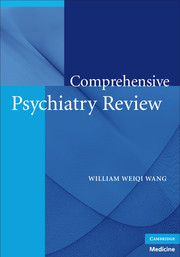Book contents
- Frontmatter
- Contents
- Introduction
- PART I INTELLECTUAL FOUNDATION OF PSYCHIATRY
- PART II EVALUATION AND MEASUREMENT
- PART III PSYCHIATRIC DISORDERS
- PART IV PSYCHIATRIC THERAPEUTICS
- PART V NEUROPSYCHIATRY AND RELEVANT NEUROLOGIC CONDITIONS
- PART VI SPECIAL TOPICS
- PART VII REVIEW QUESTIONS
- Questions (1–150)
- Answers (1–150)
- Bibliography
- Index
Answers (1–150)
from PART VII - REVIEW QUESTIONS
Published online by Cambridge University Press: 18 January 2010
- Frontmatter
- Contents
- Introduction
- PART I INTELLECTUAL FOUNDATION OF PSYCHIATRY
- PART II EVALUATION AND MEASUREMENT
- PART III PSYCHIATRIC DISORDERS
- PART IV PSYCHIATRIC THERAPEUTICS
- PART V NEUROPSYCHIATRY AND RELEVANT NEUROLOGIC CONDITIONS
- PART VI SPECIAL TOPICS
- PART VII REVIEW QUESTIONS
- Questions (1–150)
- Answers (1–150)
- Bibliography
- Index
Summary
1. Answer: D.
After a period of life-threatening experience in Iraq, the patient developed persistent reexperience, avoidance, and increased arousal symptoms, that did not present before the trauma. The symptoms caused significant distress. The duration of symptoms is more than 3 months. The onset of symptoms is more than 6 months after the stressor. Th e diagnosis is posttraumatic stress disorder (PTSD), chronic, with delayed onset.
The symptoms are prominently anxiety spectrum, and closely related to his traumatic experience. The depressive symptoms actually are not significant. Panic disorder with agoraphobia could not explain the flashback symptoms. Though there may be some degree of confusion, which is likely dissociative symptoms, there are no clear cut psychotic symptoms. Nightmare is only part of the PTSD, it dose not warrant a separate diagnosis.
2. Answer: A.
Nondeclarative memory is also known as implicit memory. It deals with skills, habits, and nonassociative learning. It does not require conscious awareness and concentration. Nondeclarative memory usually remains intact after brain injury. Brain structures involved in nondeclarative memory are – basal ganglia, limbic system, and perceptual cortex.
Declarative memory is also known as explicit memory. It deals with facts, events, and associative learning. It requires conscious awareness and concentration. Declarative memory is often impaired after brain injury. Brain structures involved in declarative memory are – hippocampus, orbitofrontal cortex, and parahippocampal gyrus.
- Type
- Chapter
- Information
- Comprehensive Psychiatry Review , pp. 411 - 438Publisher: Cambridge University PressPrint publication year: 2009



